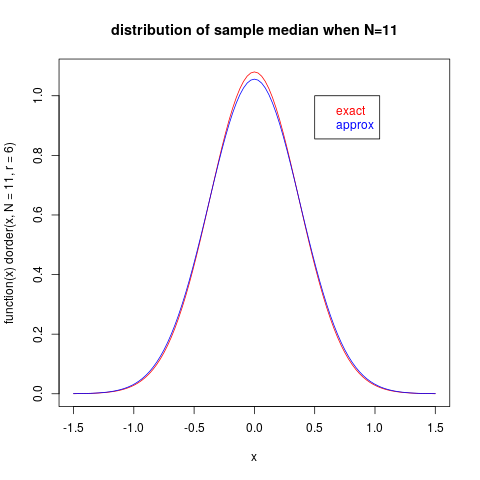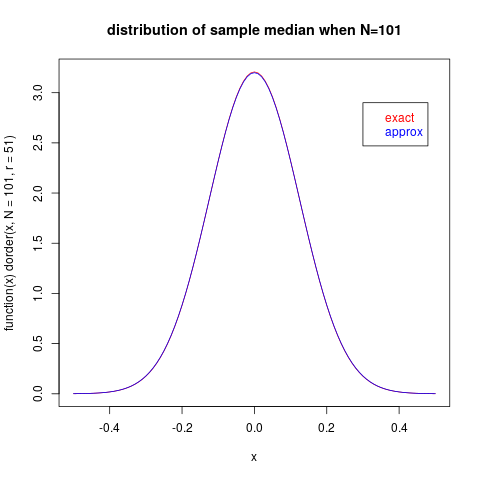I will make some illustrations with R. First, using results discussed at Central limit theorem for sample medians the asymptotic distribution of sample median of $N$ iid observations from a normal distribution is itself a normal distribution centered at the theoretical median $\mu$ and with variance $\frac{2\pi \sigma^2}{4 N}$ where $\sigma^2$ is the variance of the parent distribution. The sample median is the central order statistic, and in the case $N=2s+1$ is odd, it is the order statistic of order $s+1$, which have a distribution we can calculate exactly rather easily (theory given in the cited post and elsewhere at this site). I will use some R function I detail at the end of this post to compare the exact and approximate distributions of the sample median. We use the standard normal for parent distribution.
First with sample size $N=11$:
The approximation is already quite good! Let us look at the case $N=101$:
Here the approximation is virtually exact. Some R functions for distributions of order statistics:
porder <- function(x, N=1, r=1, basename="norm", ..., log.p=FALSE) {
pfun <- get(paste("p", basename, sep=""))
stopifnot(r <= N)
prob <- pfun(x, ...)
retval <- pbeta(prob, r, N-r+1, log.p=log.p)
retval
}
dorder <- function(x, N=1, r=1, basename="norm", ..., log=FALSE) {
pfun <- get(paste("p", basename, sep=""))
dfun <- get(paste("d", basename, sep=""))
stopifnot(r <= N)
logdens <- -lbeta(r, N-r+1)+(r-1)*pfun(x, ..., log.p=TRUE) +(N-r)*pfun(x, ..., lower.tail=FALSE, log.p=TRUE) + dfun(x, ..., log=TRUE)
retval <- if (log) logdens else exp(logdens)
retval
}
qorder <- function(p, N=1, r=1, basename="norm", ..., log.p=FALSE) {
pfun <- get(paste("p", basename, sep=""))
qfun <- get(paste("q", basename, sep=""))
stopifnot( r <= N)
retval <- qfun(qbeta( p, r, N-r+1, log.p=log.p), ..., log.p=FALSE)
retval
}
rorder <- function(n, N=1, r=1, basename="norm", ...) {
qfun <- get(paste("q", basename, sep=""))
qfun( rbeta(n, r, N-r+1), ... )
}


